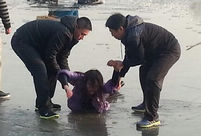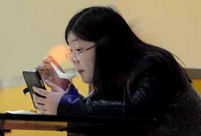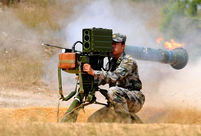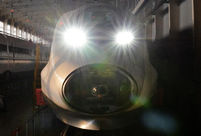 Sichuan money wall for dividend payment
Sichuan money wall for dividend payment Li Na crashes Belinda Bencic in 2nd round at Australian Open
Li Na crashes Belinda Bencic in 2nd round at Australian Open
 Shocking moments when PLA's weapons open fire
Shocking moments when PLA's weapons open fire Famous Lanzhou beef noodles
Famous Lanzhou beef noodles Armed Police hold anti-terrorism drill in SE China's Xiamen
Armed Police hold anti-terrorism drill in SE China's Xiamen Harbin Int'l Ice and Snow Festival opens
Harbin Int'l Ice and Snow Festival opens 'Jin' named the word of the year by cross-strait netizens
'Jin' named the word of the year by cross-strait netizens Chinese scientific expedition goes to build new Antarctica station
Chinese scientific expedition goes to build new Antarctica station
 Chinese naval escort fleet conducts replenishment in Indian Ocean
Chinese naval escort fleet conducts replenishment in Indian OceanWashington is applying double standards by developing new technology to attack foreign databases — even if the computers are not connected to the Internet — while playing up cyberthreats from others, China's Foreign Ministry said on Thursday.
Ministry spokesman Hong Lei made the remarks in response to a New York Times report published on Tuesday that gave details of the US spyware, which reportedly set the Chinese military as a major target.
"For some time, the relevant country has on one hand played up the cyberthreats from other countries, and on the other hand used various methods to implement cyber surveillance endangering the sovereignty, security and public privacy of other countries," Hong said.
He said China and Russia have proposed to the United Nations the setting up of a global standard on information security.
The spokesman called on the US to "work with the international community to create international regulations and build a peaceful, safe, open and cooperative cyberspace".
"The United States is the country which has made the most accusations about cyberattacks from other countries, but it, indeed, conducted the most surveillance on others," said Fan Jishe, a expert at the Chinese Academy of Social Sciences.
Washington has long accused the Chinese military of attacking and spying on US computers, without providing strong proof. The blame turned ironic when US National Security Agency whistle-blower Edward Snowden exposed the country's massive cyber spying program around the globe last year, with China listed among its major targets.
The New York Time's report on Tuesday said the NSA has embedded software in nearly 100,000 computers around the world to carry out surveillance.
The article, citing NSA documents, computer experts and US officials, said the agency has used a technology since at least 2008, which relies on a covert channel of radio waves that can be transmitted from tiny circuit boards and USB cards inserted surreptitiously into the computers, to conduct surveillance.
The equipment can also launch cyberattacks.
The agency calls the effort an "active defense", said the report.
Fan noted that the US not only tapped countries like Cold War rivals Russia and China, but also spied on its allies in Europe.
The NSA has used the technology to monitor foreign militaries, drug cartels, trade institutions inside the European Union and sometime US partners against terrorism such as Saudi Arabia, India and Pakistan, the New York Times reported.
Li Qinggong, deputy secretary-general of the China Council for National Security Policy Studies, said US spies using radio waves to collect information from computers that are not linked to the Internet have to be in close proximity to receive the information.
He warned that "any people trying to take such actions around a Chinese government or Chinese army complex" would be breaking Chinese law.
Cherian Samuel, a cybersecurity expert at New Delhi's Institute of Defense Studies and Analyses, said, "If it had been any other country doing this kind of thing, the US would have come down on them like a ton of bricks with punitive sanctions," according to the Associated Press.
James Andrew Lewis, a cybersecurity expert at the Center for Strategic and International Studies in Washington, told the New York Times, "What's new here is the scale and the sophistication of the intelligence agency's ability to get into computers and networks to which no one has ever had access before.
"Some of these capabilities have been around for a while, but the combination of learning how to penetrate systems to insert software and learning how to do that using radio frequencies has given the US a window it's never had before."
 In photos: Ten 'tuhao' devices in 2013
In photos: Ten 'tuhao' devices in 2013 College students saved from an ice hole by brave citizens
College students saved from an ice hole by brave citizens Gallery: Top 10 box office hits in 2013
Gallery: Top 10 box office hits in 2013 Beautiful churches around the world
Beautiful churches around the world Yang Mi, Hawick Lau hold wedding in Bali
Yang Mi, Hawick Lau hold wedding in Bali 'Phubbing' people seen everywhere
'Phubbing' people seen everywhere World's biggest snack shop in China
World's biggest snack shop in China Shocking moments when PLA's weapons open fire
Shocking moments when PLA's weapons open fire World's fastest train CRH380A assembled in E China
World's fastest train CRH380A assembled in E China Mechanized infantry brigade in tactical drill
Mechanized infantry brigade in tactical drill Sichuan money wall for dividend payment
Sichuan money wall for dividend payment 40-day spring travel rush starts on Jan. 16
40-day spring travel rush starts on Jan. 16 Charity exhibition raises money for panda protection
Charity exhibition raises money for panda protection China's national pole dancing to play 'The Butterfly Love'
China's national pole dancing to play 'The Butterfly Love'  Weekly sports photos
Weekly sports photosDay|Week|Month